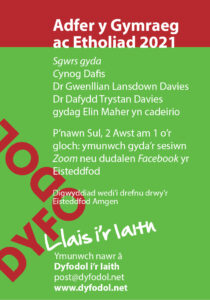The latest discussion point of our consultation on Planning the Regeneration of the Welsh Language is what kind of administrative STRUCTURES are needed to lead and co-ordinate the regeneration of the Welsh language.
As before, we would be very grateful to receive your comments, suggestions and any practical experience you may have. You are welcome to use the questions and template below or send your comments in any other format that suits you.
Below is a summary of Dyfodol’s demands regarding the kind of structures that are necessary to implement our vision. If you would like to read the full text of Planning the Regeneration of the Welsh Language, a copy is available on our website, dyfodol.net
Thank you to everyone who has already contributed to our discussion. We look forward to hearing from you – do get in touch:
or telephone 01248 811798
DISCUSSION POINT 9: STRUCTURES
Dyfodol believes that:
In setting about the task, it is essential that the organizational structure is fit for purpose. Two national bodies are currently responsible for leading and implementing Welsh language policy
1 The Welsh Language Commissioner is mainly responsible for ensuring that the rights of Welsh speakers are upheld through the Standards system. The legislation also states that s/he is also responsible for promoting the language but hitherto s/he has concentrated on regulation.
2 The Welsh Language sub-department has responsibility for all that falls outside the Commissioner’s remit. The sub-department is located deep inside the Welsh Government civil service, accountable to the head of the Education Department, who is accountable to the Director General of the Education and Public Services Group, who is accountable in turn to the Permanent Secretary. Politically, the Welsh Language Sub-department is accountable to the Welsh Language Minister, currently Eluned Morgan.
In the past, there has been some overlap between the responsibilities of these two bodies, but it is to be hoped that the Memorandum of Understanding between the Commissioner and the Government will clear up any confusion.
Dyfodol i’r iaith believes that this structure needs to be revised.
We call for the establishment of a Language Authority or Agency. Our preference would be an arms’-length body to the Welsh Government – a quango, to use old-fashioned terminology. Our second choice would be that this body be part of the Welsh Government civil service. However, it should have to be a high-status entity that could powerfully influence all Government departments and other relevant bodies
- be recognizable to the public and transparent
- be directly accountable to the Permanent Secretary, the head of the civil service and, of course, the relevant minister.
Another option would be to establish a Welsh Language Directorate on a par with the other four Directorates within the civil service.
This Agency would need sufficient capacity, as well as expertise in the fields mentioned above as well as in Sociology of Language and Language Planning. A degree of continuity and stability in its leadership would be essential. (In fairness we should note that the Minister announced at the beginning of August 2019 that the Welsh Language Sub-department is to be strengthened through the appointment of a full-time head and a number of part-time staff with language planning expertise. We see this as a step, but only a step, in the right direction.)
If all of the measures outlined above are put in place, added to unambiguous political will and leadership, together with financial resources adequate to the task, we will be, as the saying goes, in business.
Never before has there been such an undertaking in Wales. As the Basque experience demonstrates, it can work. It is a progressive, exciting project. It is essential to the wider national enterprise.
DO YOU AGREE WITH US THAT WE NEED POWERFUL NEW STRUCTRES TO LEAD THE WORK OF REGENERATING THE WELSH LANGUAGE? HAVE YOU ANY COMMENTS ON HOW TO ENSURE THE BEST ARRANGEMENTS TO UNDERTAKE THIS CHALLENGING WORK?

